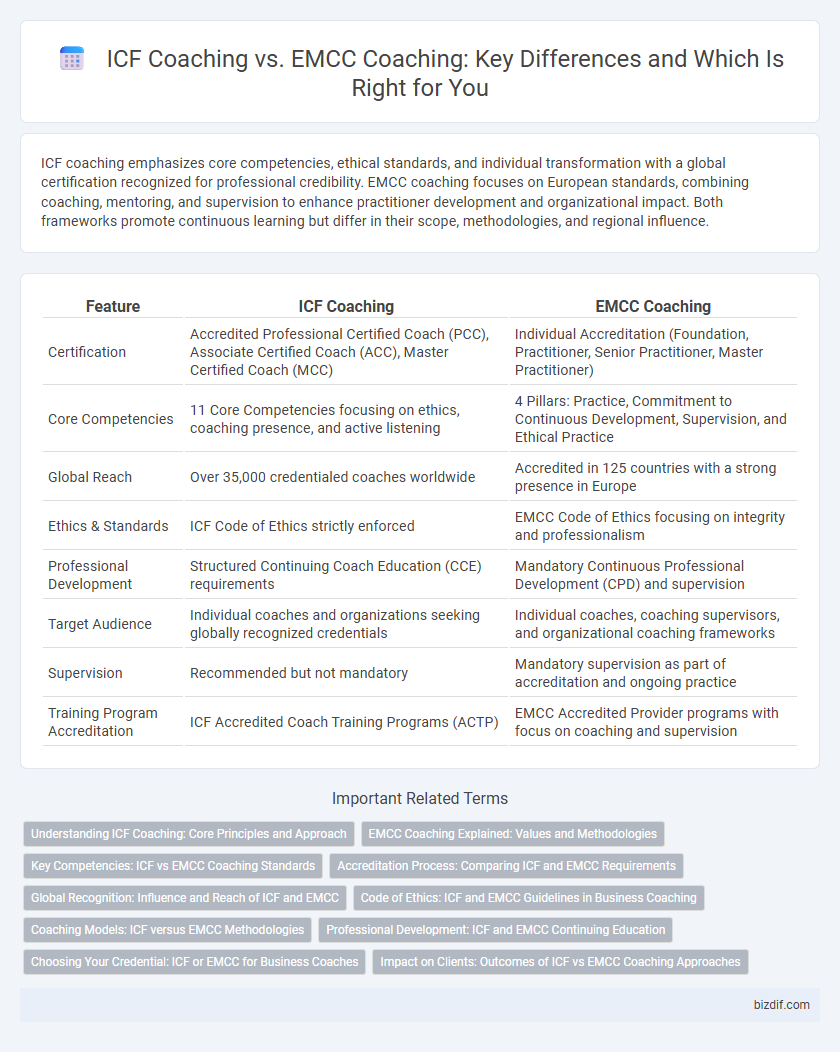ICF coaching emphasizes core competencies, ethical standards, and individual transformation with a global certification recognized for professional credibility. EMCC coaching focuses on European standards, combining coaching, mentoring, and supervision to enhance practitioner development and organizational impact. Both frameworks promote continuous learning but differ in their scope, methodologies, and regional influence.
Table of Comparison
| Feature | ICF Coaching | EMCC Coaching |
|---|---|---|
| Certification | Accredited Professional Certified Coach (PCC), Associate Certified Coach (ACC), Master Certified Coach (MCC) | Individual Accreditation (Foundation, Practitioner, Senior Practitioner, Master Practitioner) |
| Core Competencies | 11 Core Competencies focusing on ethics, coaching presence, and active listening | 4 Pillars: Practice, Commitment to Continuous Development, Supervision, and Ethical Practice |
| Global Reach | Over 35,000 credentialed coaches worldwide | Accredited in 125 countries with a strong presence in Europe |
| Ethics & Standards | ICF Code of Ethics strictly enforced | EMCC Code of Ethics focusing on integrity and professionalism |
| Professional Development | Structured Continuing Coach Education (CCE) requirements | Mandatory Continuous Professional Development (CPD) and supervision |
| Target Audience | Individual coaches and organizations seeking globally recognized credentials | Individual coaches, coaching supervisors, and organizational coaching frameworks |
| Supervision | Recommended but not mandatory | Mandatory supervision as part of accreditation and ongoing practice |
| Training Program Accreditation | ICF Accredited Coach Training Programs (ACTP) | EMCC Accredited Provider programs with focus on coaching and supervision |
Understanding ICF Coaching: Core Principles and Approach
ICF Coaching emphasizes a client-centered approach grounded in the ICF Core Competencies, fostering trust, active listening, and goal-oriented dialogue to unlock personal and professional potential. It prioritizes ethical practices and continuous coach development through accredited training and mentoring. This framework supports transformational change by aligning coaching conversations with client values and objectives, differentiating it from EMCC's emphasis on evidence-based methodologies and reflective practice.
EMCC Coaching Explained: Values and Methodologies
EMCC coaching emphasizes a values-driven approach rooted in integrity, respect, and empowerment, aligning with its European origins and commitment to professional standards. Its methodologies integrate evidence-based practices, reflective learning, and systemic thinking to foster sustainable client development and ethical practice. The EMCC framework supports continuous accreditation and supervision, ensuring coaches uphold high-quality, impactful coaching engagements.
Key Competencies: ICF vs EMCC Coaching Standards
ICF coaching standards emphasize core competencies such as setting the foundation, co-creating the relationship, communicating effectively, and facilitating learning and results, which are designed to ensure a client-centered approach and measurable outcomes. EMCC coaching competencies focus on ethical practice, continuous professional development, and evidence-based methodologies, highlighting reflective practice and supervision as key elements. Both frameworks prioritize integrity and professional excellence but differ slightly in emphasis, with ICF concentrating on interpersonal coaching skills and EMCC on systemic and developmental impact.
Accreditation Process: Comparing ICF and EMCC Requirements
The ICF coaching accreditation process requires candidates to complete specific coach training hours, accumulate coaching experience, and pass a knowledge assessment, emphasizing alignment with ICF Core Competencies and Code of Ethics. EMCC accreditation also demands verified coaching hours and approved training but places greater emphasis on reflective practice and continuous professional development within its competency framework. Both organizations require documented mentoring sessions, yet ICF focuses more on standardized credentialing levels (ACC, PCC, MCC), whereas EMCC offers a broader range of endorsement options tailored to different coaching specializations.
Global Recognition: Influence and Reach of ICF and EMCC
The International Coaching Federation (ICF) holds widespread global recognition with over 50,000 credentialed coaches spanning more than 140 countries, making it a dominant authority in the coaching industry. The European Mentoring and Coaching Council (EMCC) also maintains strong influence, particularly across Europe and parts of Asia, with a growing international presence and approximately 6,000 members worldwide. Both organizations impact coaching standards and ethics globally, yet ICF's broader membership base and extensive accreditation reach enhance its influence and accessibility in diverse markets.
Code of Ethics: ICF and EMCC Guidelines in Business Coaching
The International Coaching Federation (ICF) Code of Ethics emphasizes confidentiality, integrity, and professionalism, setting stringent standards for client-coach relationships and conflict of interest management in business coaching. The European Mentoring and Coaching Council (EMCC) Guidelines prioritize ethical practice through a comprehensive framework that includes respect for client autonomy, confidentiality, and duality in the coach's role while promoting ongoing professional development. Both ICF and EMCC guidelines aim to uphold trust and quality in business coaching by providing clear ethical boundaries and accountability mechanisms for coaches.
Coaching Models: ICF versus EMCC Methodologies
ICF coaching utilizes the Core Competencies framework emphasizing presence, active listening, and powerful questioning to facilitate client-driven transformation. EMCC coaching integrates the EMCC Competency Framework, highlighting reflective practice and evidence-based approaches for measurable client outcomes. Both methodologies prioritize ethical standards but differ in their coaching models, with ICF focusing on relational dynamics and EMCC on systemic, developmental models.
Professional Development: ICF and EMCC Continuing Education
ICF coaching emphasizes accredited Continuing Coach Education (CCE) units to maintain certification, ensuring coaches engage in extensive professional development tailored to core competencies. EMCC coaching promotes continuous development through a structured Continuing Professional Development (CPD) framework, integrating reflective practices and evidence-based learning. Both organizations highlight lifelong learning, with ICF prioritizing competency-based education and EMCC focusing on developmental progression aligned with ethical standards.
Choosing Your Credential: ICF or EMCC for Business Coaches
Choosing between ICF and EMCC credentials impacts business coaches' credibility and client trust significantly. ICF focuses on core competencies and global recognition, enhancing networking opportunities and industry standards. EMCC emphasizes continuous professional development and quality assurance, appealing to coaches seeking rigorous supervision and ethical frameworks.
Impact on Clients: Outcomes of ICF vs EMCC Coaching Approaches
ICF coaching emphasizes client-centered goals and measurable behavioral change, which leads to enhanced self-awareness and sustained performance improvements. EMCC coaching integrates systemic and reflective methodologies, promoting transformational growth by addressing both individual and organizational dynamics. Both approaches drive significant client impact, with ICF focusing on personal accountability and EMCC fostering broader systemic understanding.
ICF coaching vs EMCC coaching Infographic

 bizdif.com
bizdif.com